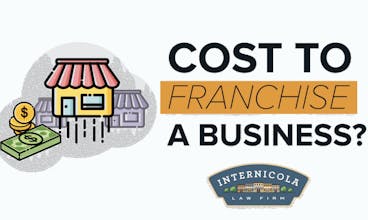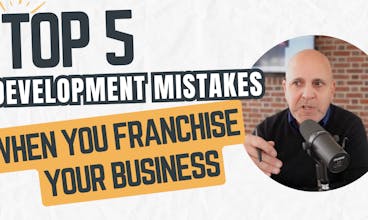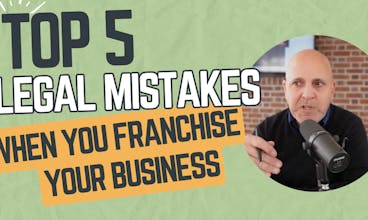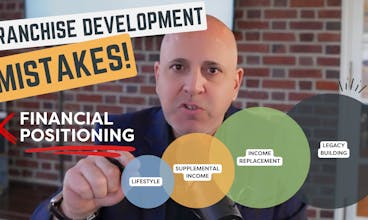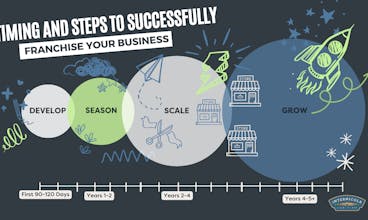What are the Responsibilities of Franchisors?
Before starting a franchise or franchising your business it is critical to evaluate and understand the role and responsibilities that you will be undertaking as a franchisor.
A franchise owner has responsibilities similar to a small business owner. The big difference is that the franchise owner has to operate under standards set by the franchisor. It is important to remember that not every business should be franchised. Not every business is successful, nor is every business person. Successful franchisors have made mistakes, and have survived them.
The Role Of A Franchisor
As a franchisor, basically, you will be taking what works and what has worked in your business and formalizing these systems and procedures so that they may be taught to and implemented by your future franchisees. Your "franchise agreement" will serve as the primary contract by which you grant third party franchisees the license and right to establish and operate your franchised business. Your role as a franchisor will include:
- Franchised Expansion
The expansion of your business, business systems, trademarks and trade dress through "franchised expansion" that will occur through third party franchisees. - Formalizing Your Systems
To achieve your "franchised expansion" you will be formalizing and documenting what works in your business and the steps that franchisees will be required to follow. These formalized systems will be identified in the following legal documents which will be prepared by your franchise lawyer: FDD (Franchise Disclosure Document) and Franchise Agreement.
The Responsibilities Of A Franchisor
Before going into the franchise business, you should consider the ongoing responsibilities you'll have to take on. You'll need to have a great understanding of what your business requires to succeed.
As a "franchisor" your primary responsibility will be to support the operations of your franchisees and to continuously develop and monitor the business systems, products and/or services that have made your business a success.
As such, your franchisor responsibilities will include:
- Finances
The number responsibility you will have is to financially support the franchise. This includes set-up costs to buy the franchise, retail space lease agreements, and marketing materials. A person buying a franchise will need to be able to show they can meet these financial responsibilities. - Marketing
As a franchisor one of your primary responsibilities will relate to establishing a marketing foundation focused on promoting your brand, legally protecting your trademarks and establishing quality standards for your products and/or services. - Managing the Products and Services of the Brand
As franchisor, to promote your brand and goodwill you will be required to establish and maintain performance standards respecting the quality of the goods and/or services provided by your franchisees. - Managing the Market Area and Territory of Franchised Locations
As franchisor, you will strategically identify territories that will be targeted for franchise expansion. Initially expansion must be focused on geographic territories that can be properly managed and supported. - Proprietary Products
Identifying and establishing exclusive suppliers who will produce and/or distribute your "propriety" products to your franchisees. - Your Time
When you buy a franchise, you're a business person. You're the boss. That means you're expected to be there, especially when you're starting out. A successful franchisor will take an assertive role in running day to day operations. It's your business—you should run it. - Partnering with Corporate
There's a reason you bought a franchise instead of starting from scratch with your business. The national brand should be all over your business. You don't only represent them, they are your partner. - Employee Training
You're the boss. That means every person working at your franchise follows your rules. They also follow your example. The corporate franchise has training sessions for management to take back to your franchises. Take a course from headquarters, it can be an invaluable help. - Providing On-going Support
Most franchise agreements require franchisors to provide ongoing support to franchisees. Support includes technical and day-to-day operating advice. Part of this franchisor responsibility helps to oversee the entire operations of the franchise network. For example, if a franchisee needs financial assistance, it is the responsibility of the franchisor to connect them with the correct professional help. - Brand Building
Your brand is what makes your franchise stand out. By operating a successful franchise, you're helping the national brand. If the brand suffers, the entire franchise system can suffer. - Providing Leadership
Don't ever forget that you're now the boss. It's up to you to set examples of the type of working environment and mentality you want in your staff and business. It might be a bad comparison, but you're the captain of the ship. How it gets steered is up to you. - Communication
This is THE most important part of your business. Do you communicate good business ideas? Are you able to express what you want your business to do in a way people can follow? Communication goes hand in hand with customer service—they're very similar skills. Having good skills communicating with your employees and customers will help keep your business going.
These are just some of the ongoing responsibilities that a franchisor may have.

